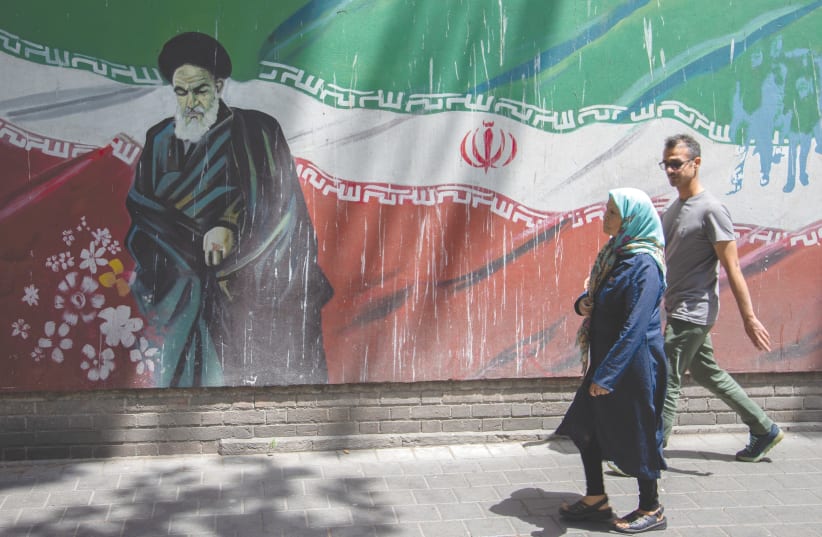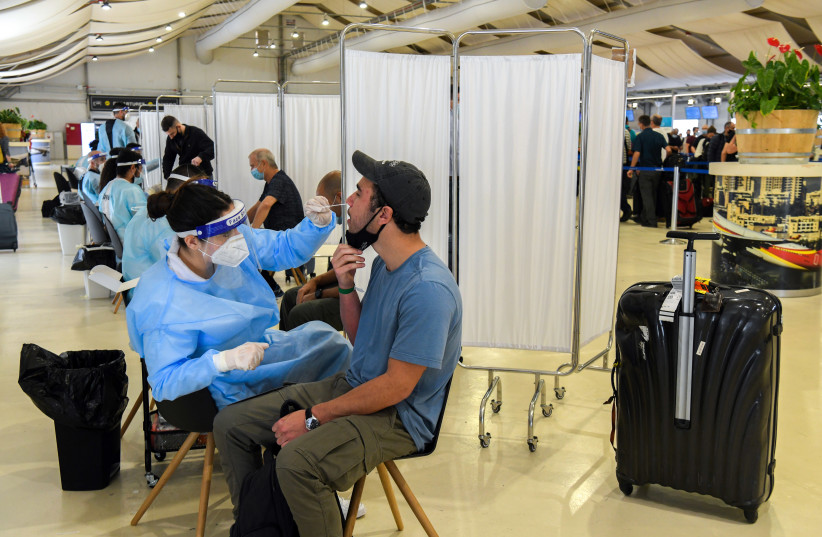Middle Eastern countries and media from Turkey to the Gulf have been focused on concerns about a new Covid variant called Omicron.
The United Arab Emirates, which said on Saturday that it had reached a milestone of 100% of the eligible population receiving the first vaccine dose, suspended entry of travelers from seven southern Africa countries due to concerns over the new Covid-19 variant. The National in the UAE reported that “The decision, which comes into effect on November 29, will affect passengers who have travelled through South Africa, Namibia, Lesotho, Eswatini, Zimbabwe, Botswana or Mozambique over the past 14 days.”
The UAE’s General Civil Aviation Authority and the National Emergency Crisis and Disasters Emergency Management Authority are monitoring the situation closely. In Jordan, Al-Ghad newspaper pointed out that Saudi Arabia, Oman, Jordan and Morocco had also joined the UAE in putting in place measures “to prevent entry to travelers or suspend flights from several African countries.”
The Kingdom of Jordan, according to Al-Ghad, has recently recorded a record number of Covid infections with some 27,204 new cases from November 20 to 26. This is apparently the most in one week since April. The paper reports that “hospital occupancy also witnessed an increase in the majority of its families, after its distribution was as follows: In the North Region, the occupancy of isolation beds increased from 23% last week to 27% currently, intensive care beds from 37% to 46%, and respirators from 19% to 31%.”
EGYPT HAS raised the level of preparedness at “quarantine departments at all land, air and sea ports, the Ministry of Health announced on Friday, after a new coronavirus variant was recently detected in southern Africa,” Al-Ahram reported.
“Egypt has halted the use of rapid ID NOW coronavirus test for arrivals from countries with COVID-19 variants starting Tuesday,” the report says. This will affect arrivals from India, Bangladesh, Pakistan, Bhutan, Myanmar, Nepal, Sri Lanka, Vietnam, Brazil - and Latin America.
Egypt had reopened tourist attractions in July 2020 but is now concerned that the influx of tourists could bring new variants. “Egypt will continue to require the submission of negative PCR test results a maximum of 72 hours prior to the arrival in Egypt, the Preventive Medicine Sector said. Travelers entering Egypt at any of four airports in the Red Sea governorate and South Sinai, however, can take a coronavirus test upon arrival. In June, Egypt allowed travellers who are fully vaccinated with WHO-approved coronavirus vaccines to enter without taking a PCR test,” the report noted.
Egypt’s Ministry of health is also “following closely the preliminary data concerning the sharp rise of coronavirus infections, especially in South Africa’s Gauteng province, and assessing the relation between the spike in coronavirus cases and the new variant,” the Al-Ahram newspaper says. “Khaled Abdel-Ghaffar, the acting health minister, ordered finishing those studies as soon as possible to submit the results to the country’s Supreme Committee for the Management of the Coronavirus Crisis.”
Saudi Arabia has also suspended flights to and from seven southern African nations due to concerns related to the spread of the new variant of COVID-19, Al-Arabiya TV says. “According to a statement carried by state news agency SPA, the seven countries are South Africa, Namibia, Botswana, Zimbabwe, Mozambique, Lesotho and Eswatini.”
An official in the Saudi Interior Ministry also said that “the decision includes suspending entry to the Kingdom for non-nationals, who come directly and indirectly from the mentioned African countries except for those who have spent a period of no less than 14 days in another country from which health procedures in the Kingdom allow entry to those coming from [there], in accordance with the approved health procedures,” according to SPA.
IN KUWAIT, Civil Aviation Department director Yousef Al-Fawza, confirmed that it sent a letter to the Association of Travel Companies emphasizing compliance with the health requirements in force in Kuwait and in other countries on all flights coming to the country, Al-Jarida reported.
“Al-Fawzan said in a statement to Al-Jarida, that the Supreme Committee for Corona Emergencies is holding its meeting today, headed by the Deputy Prime Minister and Minister of Defense Hamad Al-Ali, and we are waiting for its decisions and recommendations, which will be announced by the official government spokesman after the meeting, [and] which will relate to the new mutation.”
The Kuwaiti paper noted with concern the recent WHO spotlight on Omicron. Kuwait raised the degree of precautionary measures, and has emphasized the need for those arriving to submit a negative PCR test.
The Kuwait Ministry of Health will hold meetings during the next few hours to discuss ways and plans to confront the new mutation, Al-Jarida said. “For his part, the preventive health doctor at the Ministry of Health, Dr. Abdullah Behbehani, stressed the importance of taking exceptional measures for those coming from southern Africa and avoiding travel to those countries during the current period until the picture becomes clear about the new mutation.
"In a statement to Al-Jarida, Behbehani stressed the need to tighten health control over transit arrivals from those countries, and intensify genomic testing for those coming from those countries, pointing out that Kuwait has no direct flights with those countries.”
TURKEY APPEARS to be taking the new variant in stride while enacting some measures. It imposed a travel ban on five African countries after the emergence of the new coronavirus variant, Health Minister Fahrettin Koca said in a statement late Friday. "Travel from Botswana, Republic of South Africa, Mozambique, Namibia and Zimbabwe to our country through all our land, air, sea and rail border crossings will not be allowed as of tonight," Koca said on Twitter.
According to reports at Daily Sabah “Koca recently stated that Turkey does not intend to implement any further lockdowns or closures to manage the pandemic's reach, instead placing ‘great importance on individual precautions... particularly vaccinations,’” he said. Turkey has had a recent financial crisis as its lira was in decline and it is seeking to bring in more tourists.
In Iraq, the media didn’t seem to focus on the new variant at all. There are larger controversies locally. Uncertainty over recent elections has caused pro-Iran groups to continue protests. In the Kurdish region, there is mourning over news that a Kurdish migrant died trying to cross the English Channel to reach her fiancé. Also, the Kurdish autonomous regional government is still repatriating migrants from Belarus, where reports say some 70,000 migrants may be gathered.
Iran is apparently imposing some travel restrictions, but the overall media coverage has tried to ignore the new variant. A report at Tasnim notes that there has been a downward trend in Covid cases. However, last week there was an increase of 23%.
“In this regard, experts emphasize the slow pace of reduction of the incidence rate, and other indicators in the current situation indicate that the situation has not yet been proven and any normalization can be troublesome,” the report says.

